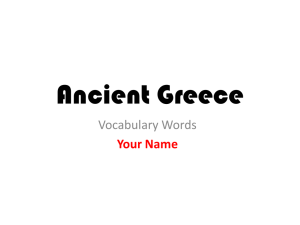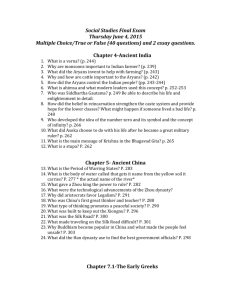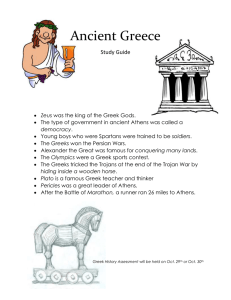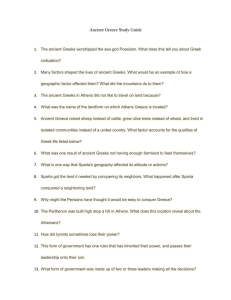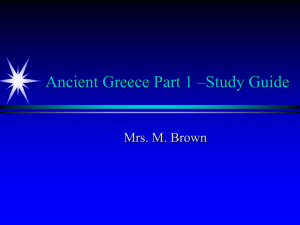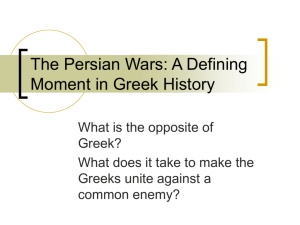Ancient Greece Test: Multiple Choice Questions
advertisement
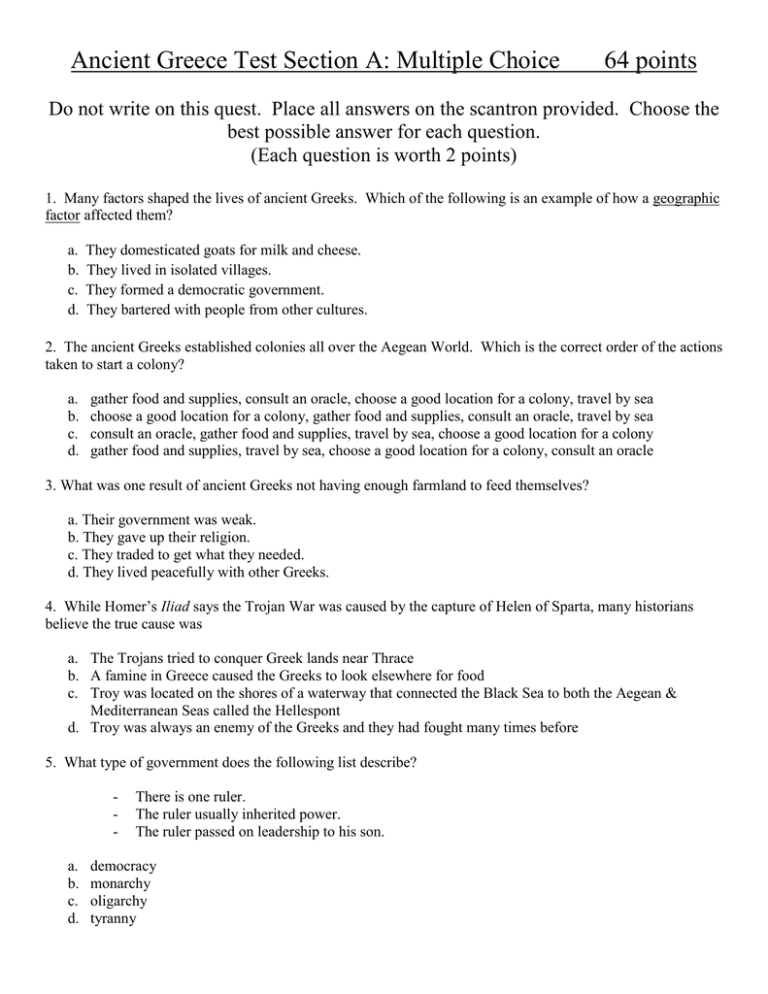
Ancient Greece Test Section A: Multiple Choice 64 points Do not write on this quest. Place all answers on the scantron provided. Choose the best possible answer for each question. (Each question is worth 2 points) 1. Many factors shaped the lives of ancient Greeks. Which of the following is an example of how a geographic factor affected them? a. b. c. d. They domesticated goats for milk and cheese. They lived in isolated villages. They formed a democratic government. They bartered with people from other cultures. 2. The ancient Greeks established colonies all over the Aegean World. Which is the correct order of the actions taken to start a colony? a. b. c. d. gather food and supplies, consult an oracle, choose a good location for a colony, travel by sea choose a good location for a colony, gather food and supplies, consult an oracle, travel by sea consult an oracle, gather food and supplies, travel by sea, choose a good location for a colony gather food and supplies, travel by sea, choose a good location for a colony, consult an oracle 3. What was one result of ancient Greeks not having enough farmland to feed themselves? a. Their government was weak. b. They gave up their religion. c. They traded to get what they needed. d. They lived peacefully with other Greeks. 4. While Homer’s Iliad says the Trojan War was caused by the capture of Helen of Sparta, many historians believe the true cause was a. The Trojans tried to conquer Greek lands near Thrace b. A famine in Greece caused the Greeks to look elsewhere for food c. Troy was located on the shores of a waterway that connected the Black Sea to both the Aegean & Mediterranean Seas called the Hellespont d. Troy was always an enemy of the Greeks and they had fought many times before 5. What type of government does the following list describe? a. b. c. d. There is one ruler. The ruler usually inherited power. The ruler passed on leadership to his son. democracy monarchy oligarchy tyranny 6. How did tyrants oftentimes lose power? a. b. c. d. They died of old age or illness. They were replaced by their wives. They were overthrown by the people. They were voted out of office. 7. In a monarchy, a small group of aristocrats advised and provided supplies for the king. What became of the aristocrats when kings no longer ruled Greek city-states? a. b. c. d. They became the ruling group. They became Ionian kings. They became democratic citizens. They became slaves. 8. Which of the following best describes the big difference between a monarch (king) and a tyrant? a. b. c. d. A monarch is elected, but a tyrant seizes power. A monarch is elected, but a tyrant inherits power. A monarch inherits power, but a tyrant seizes it. A monarch leads the assembly, but a tyrant disbands it (breaks it up). 9. What is the major difference between Athenian democracy and the democracy in the United States today? a. b. c. d. Everyone including women and slaves were allowed to vote in ancient Athens In Athens, citizens voted on all issues (for example, to go to war or a new law) In the United States, only citizens can vote In the United States, it is against the law to discuss politics in public 10. This city-state’s economy was based mostly on farming and conquering its neighbors. a. Athens b. Sparta 11. This city-state’s government was made up of 2 kings, a Council of Elders, and an Assembly. a. Athens b. Sparta 12. This city-state only educated boys in subjects such as public speaking, mathematics, philosophy, and gymnastics. a. Athens b. Sparta 13. Women in this city state were not considered citizens, and were not given very many rights compared to other places. a. Athens b. Sparta 14. The following passage might have been written by an Athenian soldier around 480 B.C.E. “I will stand shoulder to shoulder with the brave men of Greece—Spartans as well as fellow Athenians—and fight to the death, if that is what it takes to stop these murderous invaders [Persians].” What does this passage tell us? a. b. c. d. The Athenians and Spartans would have stronger armies than the Persians. The Athenians and Spartans would join together if necessary to fight a common enemy. Greece had never been invaded before. Greek men had never fought without women before. 15. Why did the Persians think it would be easy to conquer Greece? a. b. c. d. Because they knew the Greeks were peace-loving. Because they were better educated than the Greeks. Because they had more land and people than the Greeks. Because they had more people in their assembly than the Greeks. 16. To cross this geographic feature, Xerxes built a floating bridge made of boats tied together: a. b. c. d. Peloponnesus Isthmus of Corinth Attica Hellespont 17. What do the Battle of Marathon, the Battle of Salamis, and the Battle of Thermopylae have in common? a. b. c. d. They were all fought by ships at sea. The Greeks used the size of the Persian military against it. King Xerxes led the Persians in all of them. Spartans fought to the death in all of them. 18. Who was the leader of the Greek forces at the Battle of Thermopylae? a. b. c. d. Xerxes Miltiades Leonidas Darius II 19. The Battle of Marathon was Darius’s attempt to punish the ________ for assisting the _______. (Answer must be in correct order) a. b. c. d. Spartans, Athenians Athenians, Corinthians Ionians, Athenians Athenians, Ionians 20. At Marathon which of the following was not a strategy used by Miltiades and the Greeks? a. b. c. d. He used his cavalry (soldiers on horses) to overwhelm the Persians He weakened the middle of his force to trick the Persians into pushing too far forward He used a battle formation known as the Phalanx They fought in an area between two mountains 21. Which of the below was not a factor in the Greek’s decision to fight at Thermopylae? a. b. c. d. A heavily wooded area (forest) to prevent the Persians from using their cavalry Mountainous lands to prevent the Persians from surrounding them The Greeks knew the route the Persian army had to follow to strike Athens Cliff sides made for a narrow pass to restrict Persian numbers 22. What was an important result of the Persian wars? a. b. c. d. They caused Greeks to invent new gods. They led to the decline of Sparta. They enabled Persia to conquer Europe. They preserved Greek independence. 23. What was the name of the battle strategy/formation utilized by the Greek land forces? a. b. c. d. Testudo Phalanx Blitzkrieg Flank 24. What similar type of event brought about both the beginning and end of the Golden Age of Athens? a. b. c. d. Assassination of a leader Famine War Earthquake 25. Which famous Greek philosopher is famous for teaching his students to always question everything including government and religion? a. b. c. d. Plato Socrates Aristotle Alexander the Great 26. Which of these men, known as the “Father of Numbers”, was responsible for creating a way to measure an unknown distance using the two sides of a right triangle? a. b. c. d. Pythagoras Plato Archimedes Pericles 27. The Greek city-states fought against each other in the Peloponnesian War. What was a major effect of the war? a. b. c. d. Sparta was able to conquer Thebes. Macedonia was able to conquer Greece. Athens was able to enter a golden age. Thebes was able to develop astronomy. 28. What is one way Alexander used religion to control his empire? a. b. c. d. He enslaved people who did not share his religion. He encouraged people to believe he was a god. He insisted that everyone believe in Greek gods. He developed a new religion that all would share. 29. How might Alexander have described his approach to unifying his empire? a. b. c. d. “I respect the beliefs of many different peoples.” “I am a great leader who has conquered the world.” “I make sure everyone practices the same religion.” “I have Macedonians run the local governments.” 30. Alexander built cities with these features: an agora, a temple, a theater, and a university. Why did he design cities this way? a. b. c. d. Because he believed the Persians to be uncivilized. Because he wanted the cities to show off Greek culture. Because he believed people needed a public place to pray. Because he thought it would encourage people to attend plays. 31. What happened to Alexander’s empire after he died? a. b. c. d. Alexander’s son Philip took over. Greece conquered Macedonia. Alexander’s empire fell apart. Sparta won the Peloponnesian War. 32. Who was the Athenian leader responsible for the rebuilding of the Parthenon and great advancements of the golden age of Athens? a. b. c. d. Phidippides Themistocles Pericles Leonidas Name:_______________________Per.:_____Date:__________________ Greece Unit Test Section B: Short Response 10 Points “When there is a king, only the king has many rights. The people have only a small share in deciding. In an oligarchy, the power does not belong to all the people. In a democracy, it is hard for men to rise as leaders. King Cyrus of Persia believed in one-person rule. He was a just and wise man. But rule by one person can easily become tyranny. The government of Massilia is an oligarchy. It is run by a few leaders. But for the common people, this government means something like slavery. Look at the Athenians and their democracy. They did not allow one person to rise above the others. So they did not have strong leaders. Their state became weak. Kings can appeal to us by being kind and fatherly. Oligarchies can be efficient, fair, and intelligent. Democracies can promise freedom. So it is hard to make a choice. I do not approve any of these alone. I would like a government that...”(conclusion of quote intentionally removed) 1. Read the quote above from the great Roman politician Cicero. Write Cicero’s thesis sentence to introduce the reader to his argument. (5 points, using the LA Thesis Rubric) ____________________________________________________________ ____________________________________________________________ ____________________________________________________________ ____________________________________________________________ 2. Thucydides and Herodotus were two of the most famous Greek historians. Judging from the passage above, which historian would Cicero be similar to? Why? (5 points) ____________________________________________________________ ____________________________________________________________ ____________________________________________________________ ____________________________________________________________ ____________________________________________________________ ____________________________________________________________ ____________________________________________________________ ____________________________________________________________ ____________________________________________________________ ____________________________________________________________ ____________________________________________________________ ____________________________________________________________
